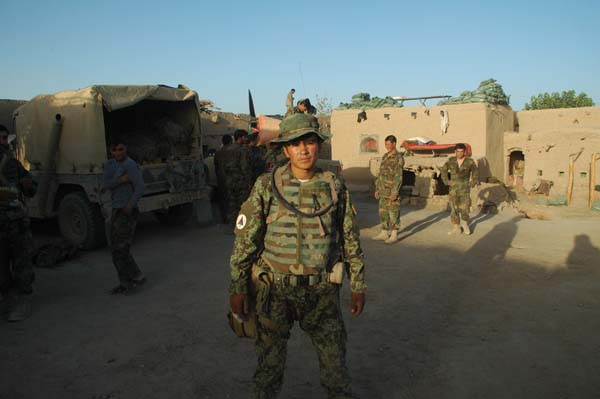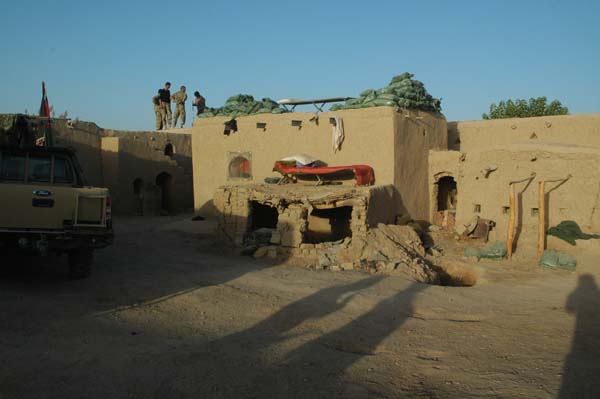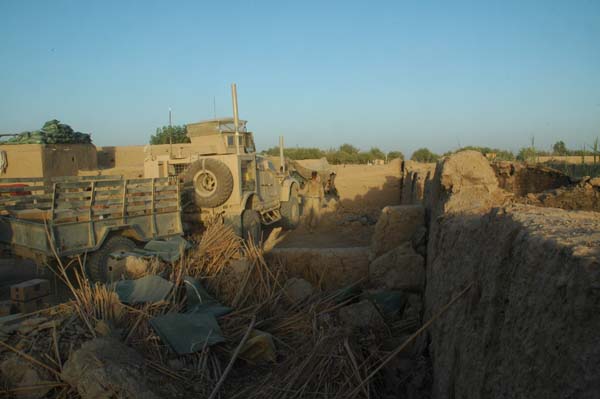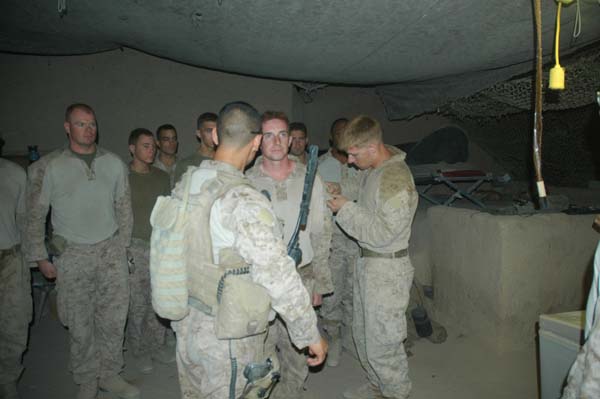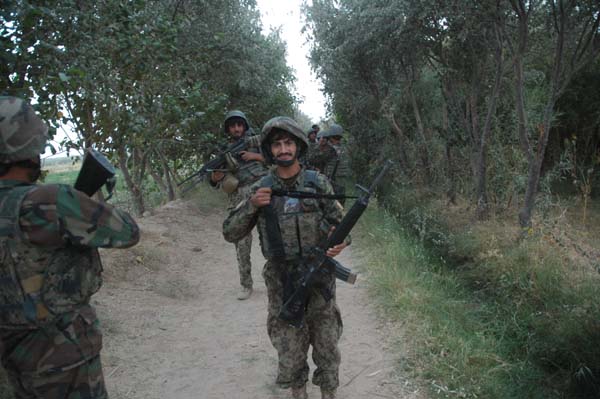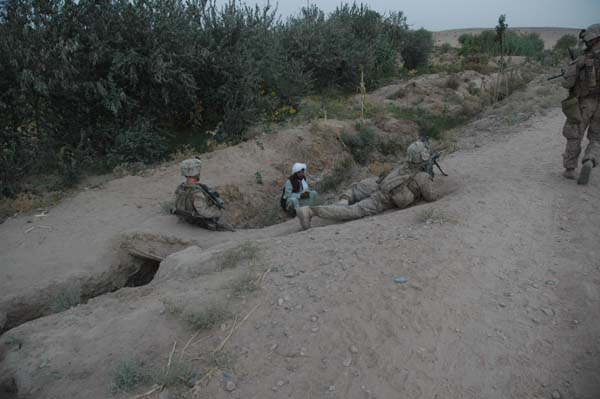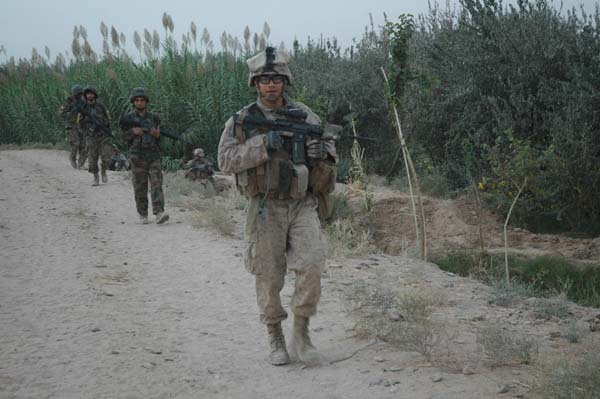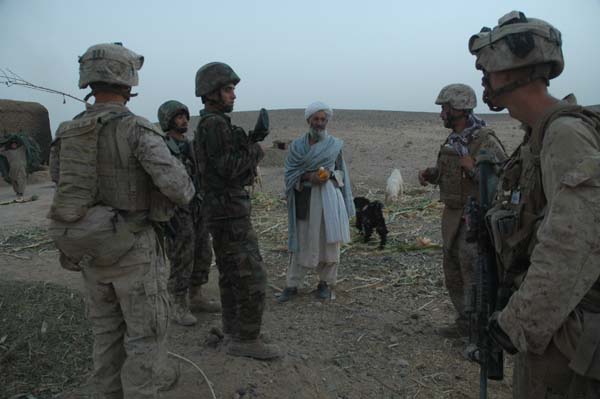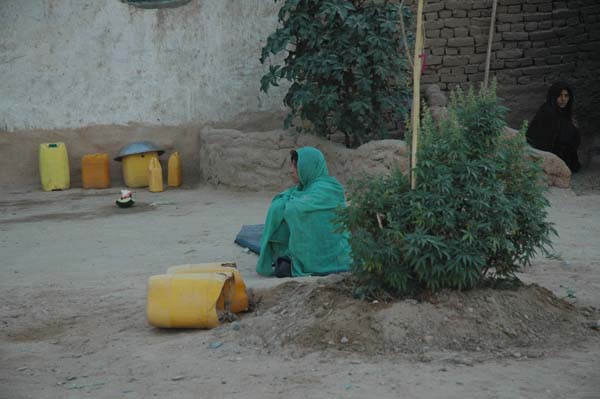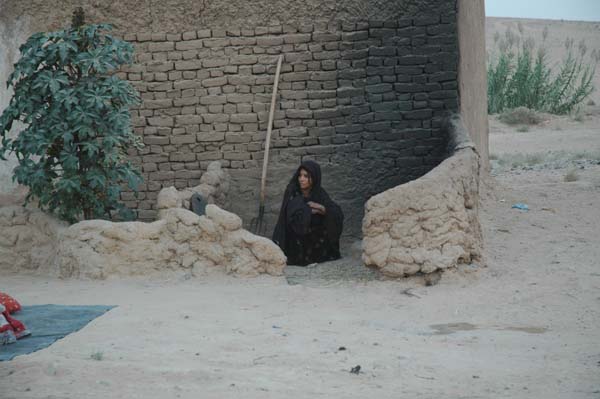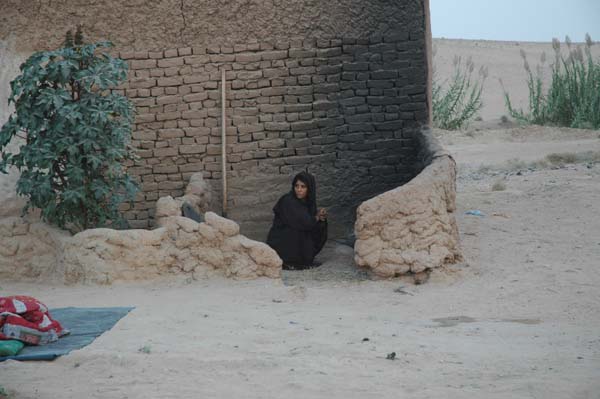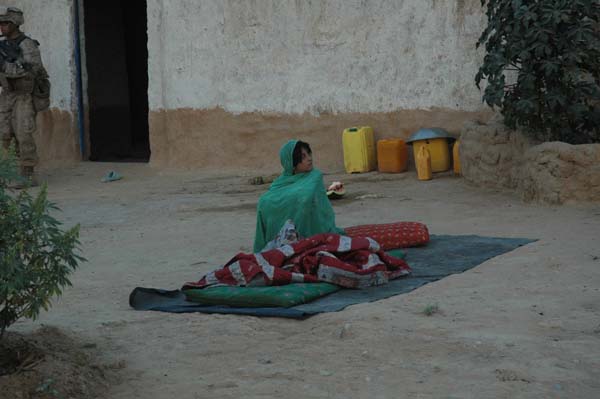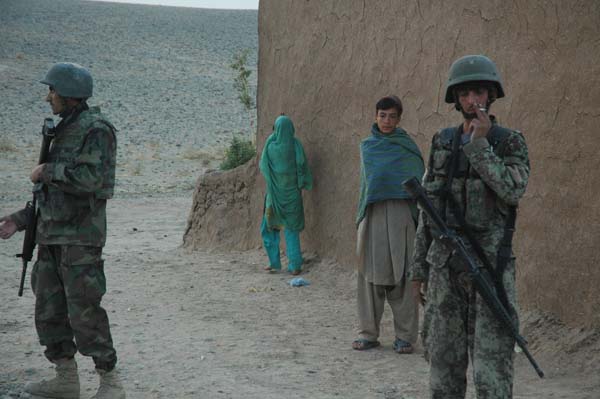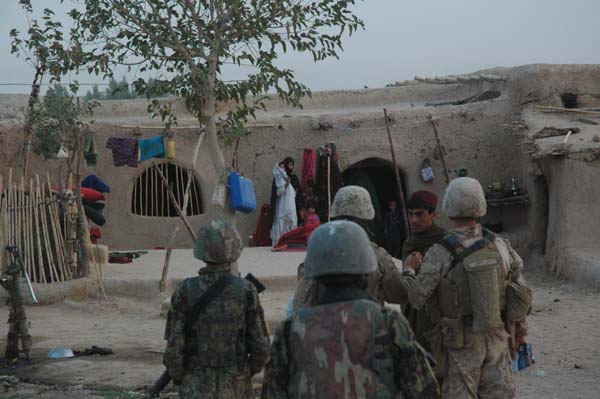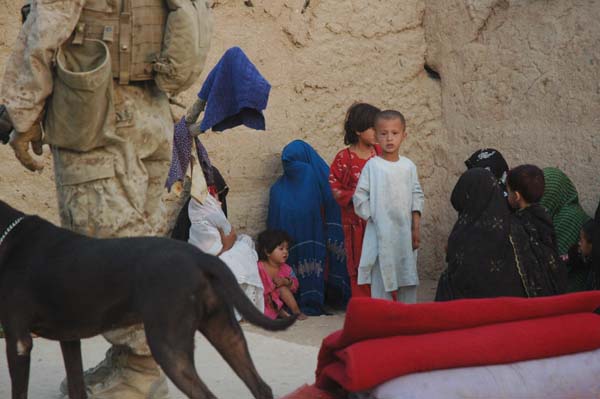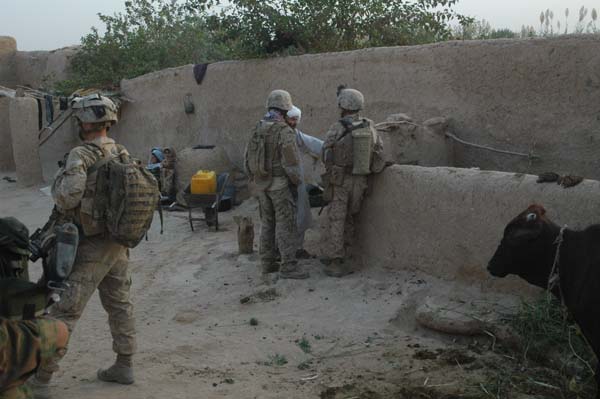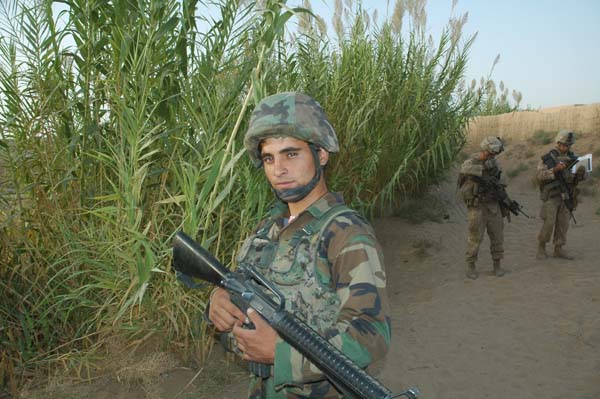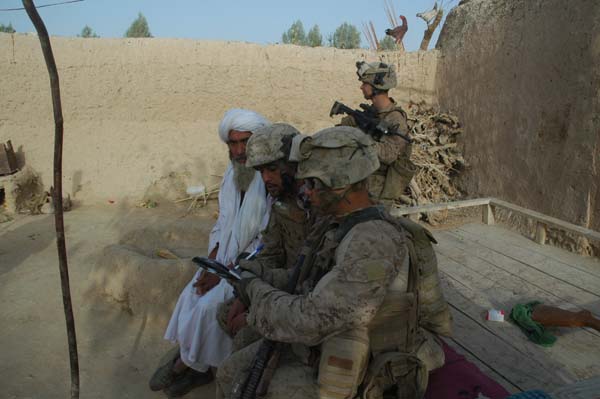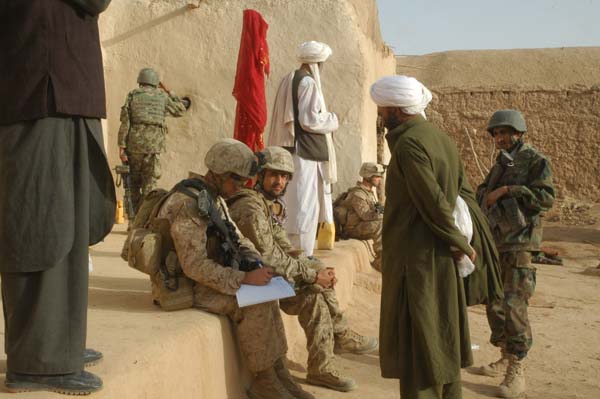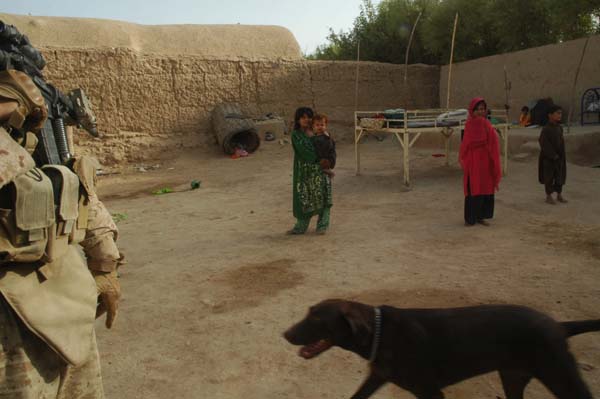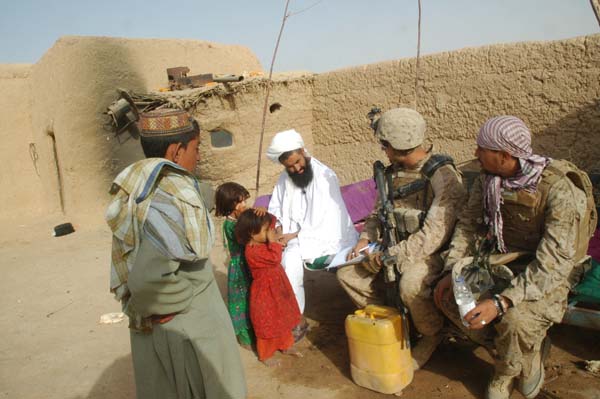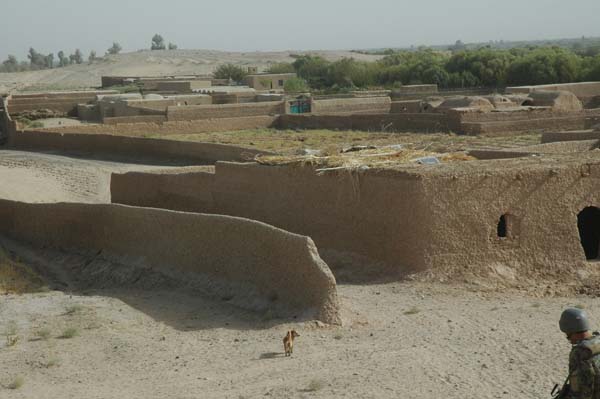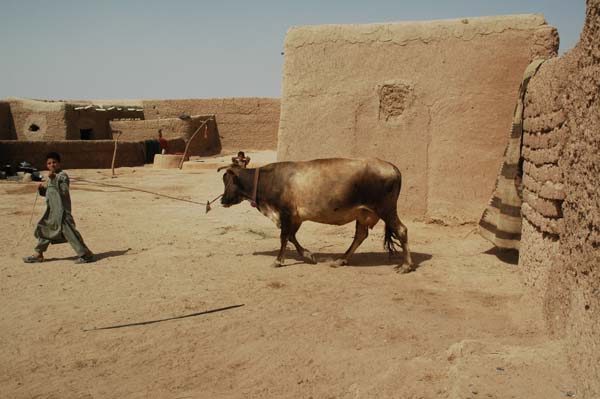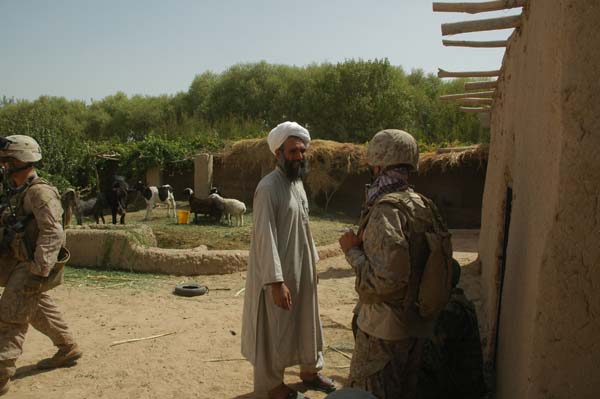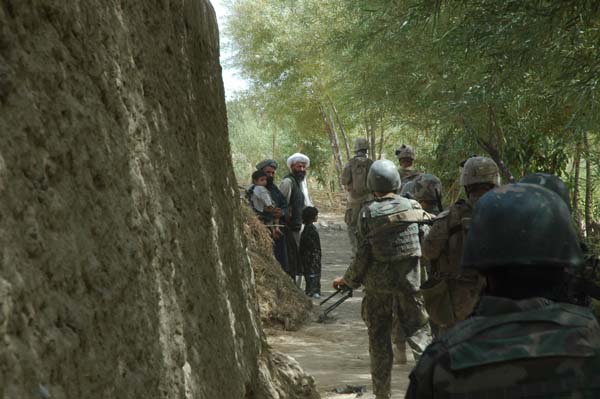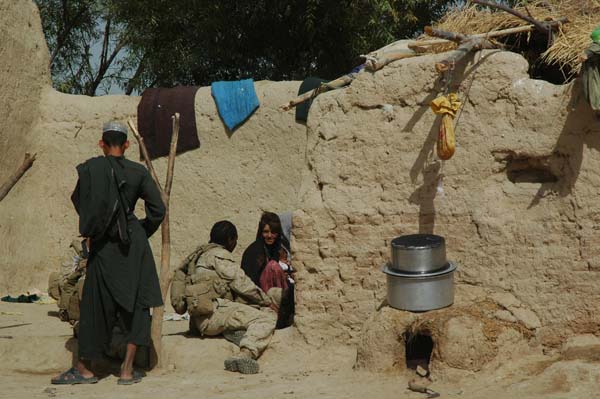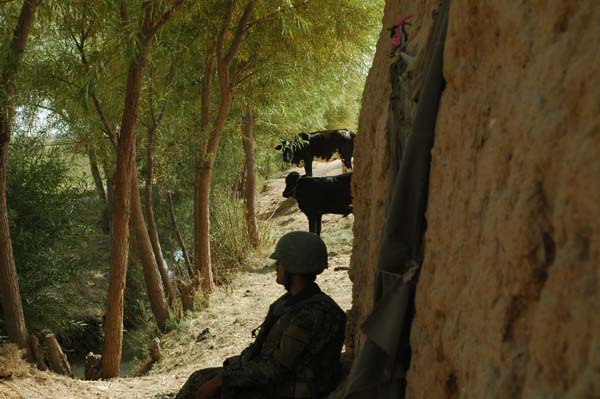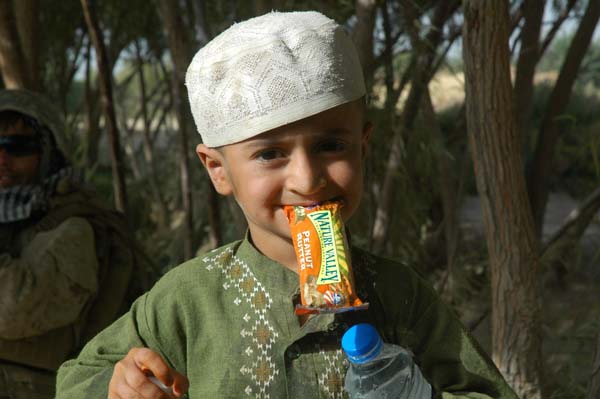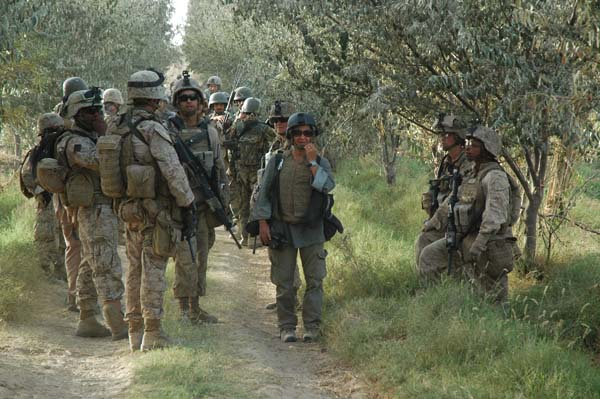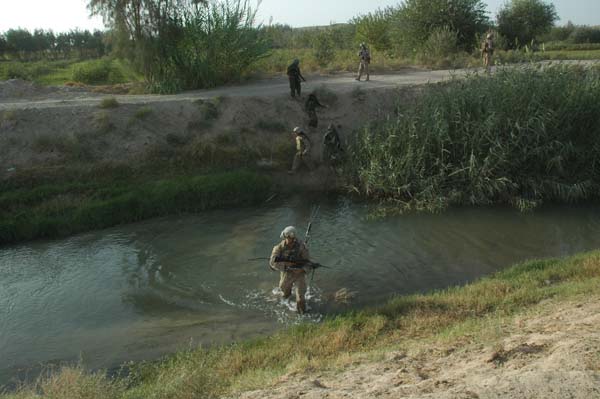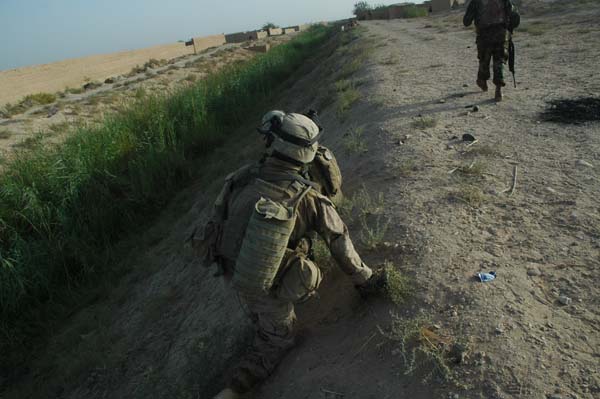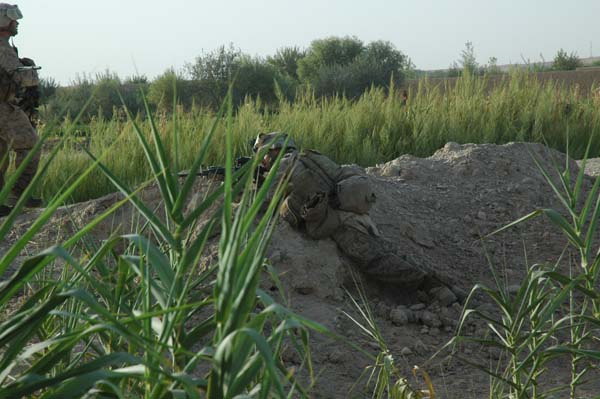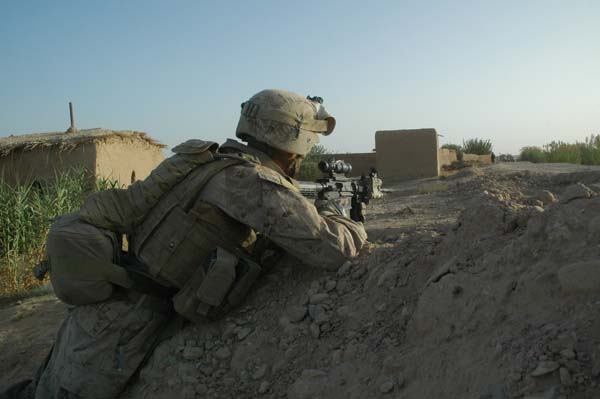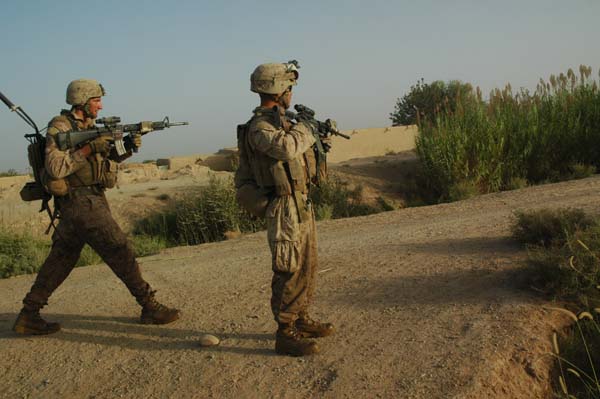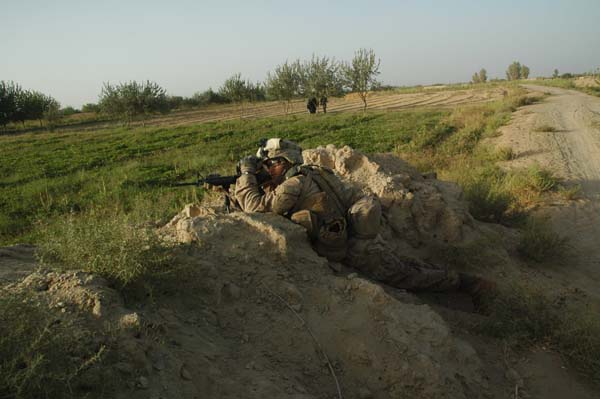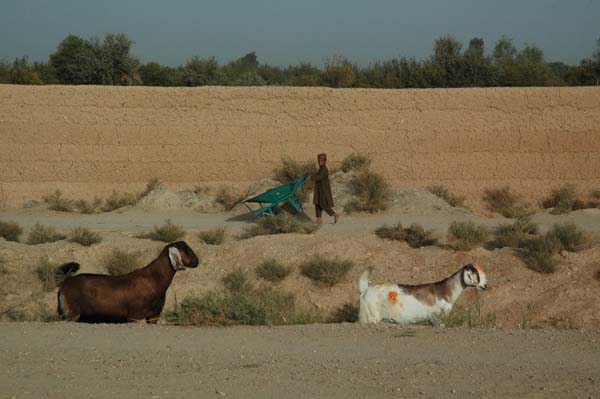

After I woke up at 0200, I realized I would not really go back to sleep all that soundly. I was cold now and very damp. The night sky was beautiful and I just starred for quite a while looking up and trying not to move so as to not feel the cold dampness of my sleeping bag. I buried myself once more in the bag and wrapped it tightly and try to garner as much warmth as I could. I would have to be up in an hour and make sure I could use the bags and get my bowels moving early enough so as not to be inhibited once in the field. This was the rough part of being out here. But, I would soon find out that the hard part was indeed coming.
Once all was taken care of, I was geared up and found SSgt Bitting and hooked up with him. He would be my contact and I would keep my eyes on him for the next couple hours, literally. He would be very important to me. During the night I had dreamt about how I was going to cross the canal. I was for sure not looking forward to it and realized that if I was to get chest deep in this canal this early in the morning and it being this cold, I was going to for sure end up with a bad cold. Oh well, then I would go home early. I was in a little over my head now. Let’s see what happens.
We stepped out at 0400 hrs right on schedule. After about 15-seconds I realized, “oh great, I cannot see a thing and I’ve got a long ways to go. What have I got myself into this time?” The only thing I could do was to pray to the Lord that I follow the Marine in front of me to the best of my ability. This is exactly what I did and for the next hour and a half, I walked completely blind only following the Marine (SSgt Bitting) as close as possible through dirt roads, canals, bridges, fields and whatever else came our way. The only thing I could do was watch with all my strength exactly where the Marine in front of me was going. It was perhaps one of the hardest things I had ever done. I remembered back to an air assault I did with 1/40 Cav in September of 2007 in Iraq and that night, we walked in the dark through fields but not for too long. I knew then it was hard, but this morning, for what seemed like an eternity, all I could do was pray and watch. I fell down a couple of times but not too seriously. Looking back at it, and having returned later over the same area in daylight hours, I see that I could have really hurt myself rather simply had I not been so intent on following the Marine in front of me. I credit my not getting hurt to SSgt Bitting and being close to him. I would end up spending a great deal of time with this man and get to know him well. It all turned out good for me. But, I will never forget walking in the dark night and not being able to see a thing. Thankfully, Sgt. Orgtega had a plan for us not to have to get chest deep in canal water. We crossed a very narrow bridge over the canal and that one set of steps was the most tricky steps I’ve had to take during my time in Afghanistan. I was so thankful that I did not get soaked and feared the worst that morning. I look back at it now and start laughing, but I will never forget praying intently and watching even harder and walking in the dark night in Afghanistan on my way to this place called Sistani village.
Shortly before sunrise, we arrived at our designated location which was a tree line on the edge of the desert on the south side of this village called Sistani. It was a desert area with mud compounds all around. There were fields running the width of the place and from the night before briefing I had an idea where I was and where others would be in relation to my position. We would be going from house to house, or I should say, mud compound to mud compound informing the residents we were going to search their places and then ask them a handful of census questions. This all seemed rather bizarre to me. I had just finished a two year temporary job with the US Department of Commerce, specifically the US Census Bureau and now here I was in Afghanistan walking on patrol before sunrise in the drug capital of the world about to photograph and audio record census taking. It’s a crazy world.
As we waited for the sun to come up, I rested with everyone else in this small ditch. It gave my back which was now completely sore, a chance to have relief. It was actually my shoulders that were hurting, the back was ok. I listened to the noises and sounds of Afghanistan out here in the middle of nowhere. Roosters crowing, dogs barking, bird making all kinds of sounds, all reminding me that it’s really not that quiet at night anywhere if one just sits still and listens. I decided that there is nowhere in the world that I enjoy dogs barking as the sun comes up. It is one of those things that really makes my blood boil.
As the daylight appeared and I heard over the radio that others were now in place who had left after us, we soon got our things ready and prepared to push out. We would now go to our first mud compound and search, clear and interview the residents. This would prove rather time consuming and after a few compounds completed, I realized that the entire day, aside from the possibility of being attacked, would pretty much be a huge, long, undesirable event that perhaps I would have been better off somewhere else. But, I am here, and I would figure out later, hopefully by the end daylight hours how to get back to Turbett if at all possible.
Once the light was now up, we proceeded to push out and head to the first mud compound we saw, which was on the far west end of the area we were assigned to clear. We came upon this place and it was early in the morning, about 0600. The air was now just right, but had a nip in it hinting that autumn was arriving on schedule. There was a female bent over a fire cooking or preparing something. There was a young male tending to a couple of goats that were tied up. The ANA that were with us were assigned to go first and do the talking. There is some reasoning behind this. What that actual reason is, could be up for debate. However, as far as I see it, the pushing into this place called Sistani village has to have an Afghan face on it for more than likely political reasons. Everything these days has a political reason behind it. On this day, I am now with a group of Marines who have some ANA with them as we go into this village which lays on the edge of the desert heading west to inform them of voting that will be taking place on the 18th, which is three days away. It is well known that the Taliban come through this area to do their operations. We have brought two female NY Times reporters with us to do a story on the interaction by female Marines with the local population of this particular village which all coincides with the provincial elections going on. What I see in all this unfortunately is someone somewhere wants this story out and for whatever reason that is, remains unknown in full to me. I have a few suspicions about it and that is perhaps it has something to do with our own upcoming midterm elections in November. I’m not quite sure. I also know that fiscal year budgets are due in October which is right around the corner. I cannot for the life of me figure out how two female NY Times reporters decided that doing a story on female engagement teams was the most critical piece of information the American public needed to know coming out of Marja, Afghanistan. It is times like this that I sense the term, “follow the money” and you may get an answer. Maybe somebody’s budget for female engagement teams needs a boost. But what do I know, I’m just an historian.
After the first mud compound was searched and the set of census questions was asked to the residents, I quickly determined that this was going to be a very long day of seemingly useless work. It does not mean that what we were doing was useless, it just seemed too orchestrated and too ridiculous to be of any real value. But I am not privy to all the reasons behind what is going on and it is not actually up to me to decide whether it is or is not a good idea to do these things. What I do know however is that by the time we reached the second mud compound I was feeling like I had just wasted my time coming out to this operation. The term dog and pony show comes to mind. Granted, we were making a statement to the Taliban that you can no longer use this area freely to move in and out of. But, to fill in the gaps with some story about female engagement teams bringing democracy and women’s rights to the females of Afghanistan in this decrepit desert village called Sistani is just not happening. I spent most of this day going in and out of mud compounds that had cow and goat shit for carpet and people that never before could either read nor write, as far as I could tell.
It was at the second mud compound that I had a run in with one of the ANA soldiers. I must preface this by saying I have now been on patrol with differing variations of ANA personnel. I have now seen the difference between semi disciplined and non disciplined ANA soldiers. The ones that I was with on this day were extremely undisciplined, used their cell phones all day long and listened to blaring Afghan music on their phones that were transformed into I-pods. All they talked about was smoking hashish and I was appalled at the difference between this group of ANA and the previous group of ANA I had patrolled with under the direction of Lt. Johnston. At one point in time, while searching and clearing the second mud compound, one of the ANA soldiers decided to tell me that I could not take any photographs. He began to get extremely cocky with me and I was in no mood to take this kind of treatment from anyone, needless to say some 18-year-old Afghan hashish smoking kid who thought just because he had a rifle on him he was going to tell me what to do.
I continued to take photographs and he continued to get more and more belligerent with me. At one point in time, I told him to basically, “fuck off” and that got his attention. The Cpl in charge of things asked me what was going on and I explained to him that this ANA guy was trying to tell me to stop taking photographs. I explained to the ANA soldier through an interpreter that he could go tell his problem to the NY Times photographer who was in the middle of the area we were clearing. The interpreter hesitated in translation and then I told the interpreter to tell the ANA soldier I was going to take any photograph I wanted no matter what he said. I told him to tell the soldier immediately as I looked deeply into the eyes of the ANA soldier. He could in no way miss how pissed off I was. At that, the soldier began getting louder and louder and the terp began trying to explain why I should not take a photograph and the Cpl in charge was listening all along. I told the Cpl that I would do whatever he (the Cpl) said, but I made it clear that a quarter mile away there were two NY Times reporters walking through fields with us attended by the Captain and they were taking all the photos they wanted and that if the ANA soldier wanted to go over and tell them to stop taking photos I would gladly go with him. I did not come half way around the world to not take a photograph.
I have been through some serious battles in my life and some of them always concerned me taking a photograph. At my age now, I just don’t really give a damn who tells me when I can or cannot take a photograph, whether they have a gun or not, especially when some female photographer can take all the photos they want. It came out later on that the ANA soldier said I was only taking photos of females. Well, that just was not true and I have had all I can take of this so called cultural sensitivity stuff in the middle of this war on terrorism. We are not helping matter much by giving in to every little whiney complaint concerning this or that and placing it all under the umbrella of cultural sensitivity. I’ve been in more cultures than most of the people I have ever met in my life and I know a scam when I see one. Most of what I have observed about hiding the women from this or that here in Afghanistan is a bunch of malarkey as far as I am now concerned. It does not mean I blatantly go out and try my damndest to cause an uproar, but, what it does mean is I can tell the difference between a young hashish smoking ANA soldier with an American made M-16 rifle in his hand trying to tell an old 55-year old American photographer just what to do. Not going to happen on my watch any more.
The Cpl in charge told the ANA soldier to shut up and get on with doing his work. I proceeded to not take photographs so openly and for the rest of the day, I felt a bit inhibited in my shooting. I took a good hard look at this ANA soldier and he starred right at me thinking I would shrink back. I said in perfect English to his face these words, “if you think you’re going to tell this American I can’t take a photograph one more time, you’re going to get that M-16 rifle that my fellow citizens made back home stuffed up your Afghan ass.” He had no idea what I was saying, but he could tell it was not pretty. He did not say anything else to me the rest of the day. And I did not let my eyes off him either. It was the one time I felt that there was a possibility that this ANA soldier could shoot me on “accident” when no one was looking. I came to find out, he and the rest of his cohorts were Pashtun. The ones I had traveled with earlier, a week or so before, were Tajiks and Hazarras. There is something to be said about all this. I will address that later.
We proceeded throughout the rest of the morning and into the very early afternoon going from mud compound to mud compound in this desert village. We kept seeing the same kind of illiterate people who in my opinion could care less or even know about anything to do with voting or democracy for that matter. I could not believe my eyes and ears when I listened to the questions being asked these folks. It sounded much like a census form I had just been dealing with for the past two years back home in NM. Now, I understand the logic behind clearing a village and finding out who lives there and how many military age males there are present. But, what we were doing was under the guise of informing these people about a provincial vote that was going to take place on the upcoming Saturday. I’m almost 100% positive that voting would be the last thing on these people’s minds. At this point I felt the whole day would be a waste of time.
Shortly after noon came, we arrived at patrol base Iwo Jima, a small base manned by a small number of Marines and a few ANA soldiers. This place is near a larger water canal that actually has a little clear water in it flowing from a check station. It reminded me of times when I used to go swimming in the checks along the irrigation canals in southern New Mexico as a kid. We stayed here for lunch and water as the rest of the folks that were present all arrived at different times. By around 1:00 pm the place was crowded and I could see just how many people had been on this mission. It was kind of big, but, I also realized that a large part of this was for the reporters that were from NY. I’m not saying this mission was designed strictly for them, but I am saying there were aspects of it that were definitely designed for them. The main part would be the females and their so called interaction with the female residents of the mud huts we were searching, clearing and interviewing residents.
On the return part of the day’s journey we went back through the same residences we had just come through only this time we had the two NY reporters with us along with the three Marine FET members and the female interpreter from the US who has been with us now about a week or so. The rest of the day had them going in and out of the same places only this time specifically speaking to only the females while the males only talked to the males. This was the part that made me begin to really think about what was going on this day. The female reporters can take photos of the same men that were telling me not to take photos of females. Why…? Because they enjoy having their photos taken especially by females and because all their so called cultural sensitivity goes right out the window when it comes down to real live dealing with men and women. Only here, the men have the control over the entire situation including all the perverted aspects of it as well. And, what I see is that trying to fight a war within all these so called “cultural barriers” is basically a ridiculous notion by any stretch no matter what anyone thinks. This type of political correctness does nothing more than cause further problems. I do not agree with so much emphasis on cultural awareness. It does not mean I am not sensitive to it, it just means I am more practical about it than some yuppie in Washington DC trying to make things look good on paper.
We continued the rest of the afternoon going in and out of mud hut compounds that we had been into earlier in the day. By the end of the afternoon, we had pretty much arrived back at the tree line we had started out at around sunrise only now we had all kinds of folks with us. This part of the mission was now over for all practical purposes. Lt. Johnston and a platoon of his ANA soldiers took over a place and remained out in Sistani village and are still there for the time being as of this writing. They will stay there until this election is over. By the time all the folks had gathered at the tree line and arrived from their subsequent visits to mud hut compounds, it was now late in the afternoon and darkness would be setting in soon. We would all proceed at intervals across the big canal and wade through it at a shallow point. We proceeded to do this and one at a time we crossed the water. As we were crossing I was looking south when Lt. Stuhler and I discussed how things are looking towards the south. He had told me that we don’t really want to go more than 50 meters or so to the south and that he would rather wade through deeper water. He explained to me that the enemy always attacks from the south for particular reasons which boil down to the fact that his area of responsibility ends “right over there” as he pointed to where he was explaining. And that is also what the enemy knows, he told me.
As we crossed the canal, I thought of what he had just told me. No sooner than that, after I crossed the canal, shots began to ring out. There it was, just as Lt. Stuhler had just told me. The enemy had waited for our day to come to an end, and then opened up on us. I immediately ran forward to the Marines that were now going towards the shooting. I found myself hooked up with corpsman Gonzalez, whom I know to be from my home town, Albuquerque, New Mexico. I thought to myself, “what better person to be with than a hometown guy”. Could not have planned it any better.
As he was given directions, I stayed close on him as the rest of the Marines did their things one of which was to get the female reporters to safety as well as the FET team members and the female interpreters. I would stay with the Marines pursuing the fight until they did not go any further. This whole thing lasted no more than a few minutes but I thought for such a long day, something like this was at least a bit of excitement that made coming out at least a bit more worth it. Now I was beginning to feel and sound just like some of the Marines. If we’re going to come out here than by golly let’s do what we are trained to do. And I, being a photographer-historian, will record it when it goes down. That is how I felt the moment the shots rang out. I actually hoped we would track them down and pursue them. But, the call came to leave it be and continue with our returning to patrol base Chosin. This would be the end of the today’s operation for me.
We got back to the patrol base and I realized that mobile was going to head back to COP Turbett and I would try my hardest to catch a ride. I had had enough of all this stuff related to Sistani village and the election set up. I had heard that it was quite possible that after all this work up for Sistani village, the Afghans who are part of the election committee would probably decide to move the polling places to the little town of La Cocharay (sp?) which would be right next to the COP. I knew that the next day, the 16th, there would be some other things going on such as a “shura” to discuss with the village elders things concerning the election and the movement of Taliban fighters in and out of Sistani. I decided I did not need to see that and it would be better for the NY Times reporters to take all that in. I’m sure they would be able to put a good spin on it no matter what the reality of it all was. I was done. I had enough of this type of thing. I will go back to Turbett and let the political side of this war takes its own shape without me on this one. This is exactly what I ended up doing.
Once I got back to patrol base Chosin, I got my things ready and spent a good deal of time talking with Sgt. Ortega. He too was a bit disgusted with today’s mission only because he is more of a warrior than a diplomat. The political stuff just doesn’t cut the mustard with him. We talked at length about many things and he was quite friendly to me and really got to know me for who and what I am doing here in Afghanistan. We laughed about how I could not see a thing in the early morning darkness and he apologized for not realizing I had no NVG’s. I told him I just stayed within one or two steps of the Marine in front of me. It was all good. He invited me to come and spend time with his platoon before I leave. I told him I would try but that it would be unlikely I could get out to his platoon. But I told him I’ll keep the option open.
By now it was getting very dark and my ride back to Turbett was now secured. We would be leaving shortly. Mobile told me where my truck was and showed me which seat was mine. The others would be staying one more night at least. Not me. I was done. We got back to Turbett and I unloaded my gear in my tent. I was pretty dirty, very tired, thirsty and a little hungry. I would get to bed this way on this night. The next morning I could get up and get cleaned up all I wanted to.
I was thinking back on all that I had just experienced. Was present during a big operation that no one was exactly sure how it was going to go down. The enemy was not exactly expected to fight on this day but if he did decide to do so, he would have been met with severe fire power. I came under fire at the end of the day which is always when I have been under fire since being here. It is at or towards the end of every patrol, no matter what it’s length is. This tells me that the enemy has good information on some of the movements the Marines make. I know there is more to moving into the village of Sistani than meets my little eyes in the big picture of things. But on this day what I saw was that NY Times reporters somehow got a heads up that all this was going to take place and that showing a few American females talking to some illiterate Afghan females in some little tiny desert village in Helmund province is for some unknown reason big news for the American public according to the NY Times.
The polling place for the vote in Helmund province was changed eventually from Sistani village back to the little community where I am called Coocharay. We all said that is exactly what would happen. During the operation to clear Sistani, a whole lot of assets were used including aircraft, vehicles, personnel, and all the logistics that goes along with that. No matter how one tries to cut the mustard on this one, it cost a lot of time, energy and money to go visit this small village called Sistani. I’m tired this day. It’s been a long one and I’m getting more cynical the more I try to write about it. I have veered a little off course in my writing. Apparently that is the first sign I have been here a bit too long maybe. What has happened to just recording for history what is going on.? I will go to bed to now. The rest of the people out there will come home late the next day or even well into the night. I hit the sack dirty and tired.
This was the end of September 15, 2010 which was over for me at around 10:00 pm at COP Turbett in Afghanistan. Tomorrow would be a day to clean up for sure. But for now, I must sleep.
Jim Spiri jimspiri@yahoo.com
